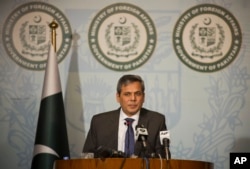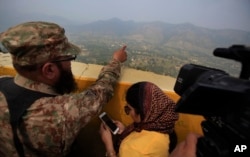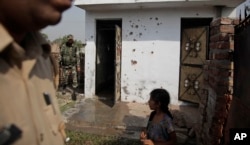Pakistan has accused eight Indian diplomats of espionage and sponsoring terrorism on its soil, just days after withdrawing six of its diplomatic staffers facing similar allegations in India.
The reciprocal actions come as military clashes between the two nuclear-armed rival nations continued across their disputed Kashmir border amid fears of another full-scale war in the region.
“A number of Indian diplomats and staff belonging to the Indian intelligence agencies RAW (Research & Analysis Wing) and IB (Intelligence Bureau) have been found involved in coordinating terrorist and subversive activities in Pakistan under the garb of diplomatic assignments,” foreign ministry spokesman Nafees Zakaria said Thursday in Islamabad.
He identified India’s commercial counselor, Rajesh Kumar Agnihotri, as RAW’s station chief in Islamabad.
India reacts
India rejected the allegations as "baseless."
"We completely reject the baseless and unsubstantiated allegations made by Pakistan against certain officials of the Indian High Commission in Islamabad” Indian foreign ministry spokesman Vikas Swarup told reporters in New Delhi on Thursday. “The allegations against the Indian officials represent an afterthought and a crude attempt to target these officials for no fault of theirs”, he said.
New Delhi says the officials named by Islamabad were involved in promoting people-to-people, trade and economic contacts between the two countries.
“We also regret the fact that Pakistan’s step adds to the risks to peace and security in the region emanating from Pakistan’s support to cross border terrorism against its neighbors,” Swarup said.
Pakistan details allegations
Back in Islamabad, foreign ministry spokesman Zakaria released a list of alleged espionage activities the Indian diplomatic staff was involved in.
They included alleged subversive activities aimed at fueling violence in the province of Baluchistan and the largest southern port city of Karachi. Zakaria added the network was also plotting to sabotage the China-Pakistan Economic Corridor or CPEC.
Beijing is investing around $50 billion to build road, rail and communication networks to link western China to Pakistan's deep-water port of Gwadar on the Arabian Sea.
The foreign ministry spokesman asserted that Indian officials were also in contact with the anti-state Pakistani Taliban in their bid to damage Islamabad’s relations with neighboring Afghanistan.
“This is the gravest development that goes against the accepted norms of conducted diplomatic relations. This serious and most deplorable development is under constant review by the relevant authorities who will determine the next course of action,” Zakaria said when asked whether the Indians will be expelled from Pakistan.
He criticized India for subjecting a Pakistani diplomatic staffer to torture and a beating before expelling him from the country last week and later deliberately releasing names of six other diplomats accusing them of terrorism.
Zakaria defended the withdrawal of the Pakistani diplomatic staff, saying the media leaks endangered their lives while their families were harassed, preventing them from undertaking diplomatic duties.
Deadly clashes
The diplomatic actions and counter actions follow days of clashes along the Line of Control that separates the Indian and Pakistani portions of Kashmir.
The skirmishes left at least 20 people dead, mostly civilians, while dozens more were wounded and thousands fled to safer places.
An already tense relationship between India and Pakistan worsened after New Delhi accused Islamabad of being behind a September militant raid on an Indian military base in Kashmir that killed 19 Indian soldiers. Pakistan rejected the charges.
Days later, India announced it conducted retaliatory “surgical strikes” on the Pakistani side of the Kashmir frontier to eliminate militants, assertions Islamabad rejected as “concocted and fabricated”.
Bilateral relations have since plunged to new lows amid fears the military clashes could escalate into a full-blown war.
India and Pakistan have fought three wars, two over Kashmir, since gaining independence from Britain in 1947. But the rival nations have since equipped their militaries with nuclear weapons, raising concerns of nuclear exchanges in the event of a war.







